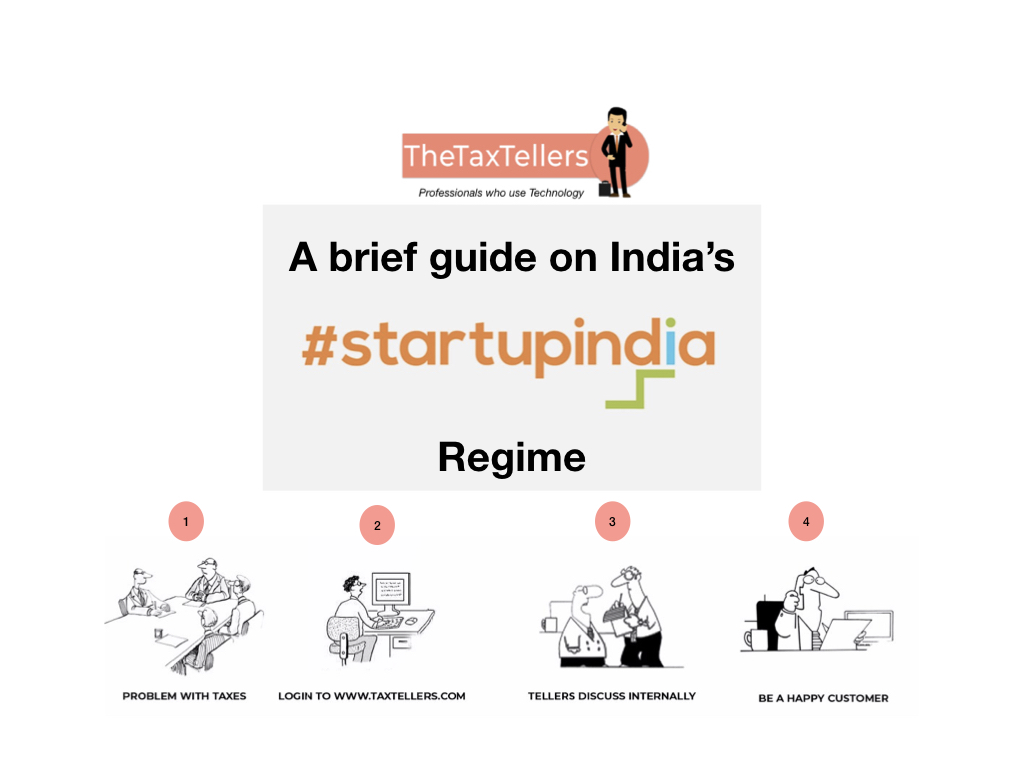#StartupIndia #MakeinIndia #Indiagrows #employment #angeltax #Incometax #Incubator #StartupTellers
Startup India is an initiative launched by government of India in 2016 by Hon’ble Prime Minister of India to boost the spirit of entrepreneurship in India’s youth with a vision of turning India into a job creator than a seeker.
It is intended to build a strong ecosystem that is conducive to the growth of startup businesses, to drive sustainable economic growth and generate large scale employment opportunities in the country.
1. What is Startup India Regime?
Startup Indian regime is intended to build a strong eco-system for nurturing innovation and startups in the country that will drive sustainable economic growth and generate large scale employment opportunities.
The Action Plan was launched with hopes to accelerate spreading of the Startup movement in following sectors:
- (A) Digital/ technology sector
- (B) Agriculture,
- (C) Manufacturing,
- (D) Social sector,
- (E) Healthcare,
- (F) Education, etc
This scheme has 3 objectives:
- I. Simplification and handholding: Includes easy compliance regime, legal support and fast-tracking patent examination at lower costs, relaxed procurement norms, and providing faster exit for startups.
- II. Funding support and incentives: Includes providing funding support through a funds, credit Guarantee Fund, tax exemption on capital gains and business income and providing collaboration platform.
- III. Industry-academia partnership and incubation: Includes promoting startup ecosystem, increasing performance of private sector, developing national institutes, etc.
2. What is a Startup?
As per the latest notification 127 of DIPP issued in 19 February 2019, Startup means an entity, incorporated or registered in India in the form of a Private Limited Company (PLC) /Reg. Partnership firm (PF) /LLP not older than 10 years. In order to register under Startup Regime, annual turnover should not exceed Rs. 100 crore in any preceding financial year since its incorporation.
An entity can be registered under start up regime only if:
- It is working towards innovation, development, deployment or commercialisation of new products, processes or services driven by technology or intellectual property.
- It is not formed by splitting up, or reconstruction, of a business already in existence.
However, for the purpose of income tax, any machinery or plant or any part thereof previously used for any purpose is transferred to a new business and the total value of the machinery or plant or part so transferred does not exceed 20% of the total value of the machinery or plant used in the business.
3. What type of businesses are covered under Startup regime?
A business is covered under the definition of a Startup if it aims to develop and commercialise
- a new product or service or process; or
- a significantly improved existing product or service or process, that will create or add value for customers or workflow.
However, the mere act of developing products or services or processes with no or limited incremental value for customers or workflow would not be covered under this definition.
4. What is the procedure of registering under Startup India Regime?
Recognition of startups has to be done by DIPP based on an electronic application. In order to register under regime, an online profile has to be created on website/ via a mobile app following a simple process.
- 'Register' and fill in the details as required in the registration form. An OTP will be sent to your registered email address, post submitting which your profile will get created.
- You will have an option to select your profile type. For 'Individuals', the profile goes live immediately, whereas for 'Startups', the profile goes under moderation for 24-48 Hrs, post which you will be able to avail all benefits on www.startupindia.gov.in.
5. What are the benefits available to a startup under Income Tax Act, 1961?
A startup recognised by DIPP is eligible for following benefits under Income Tax Act:
- For Companies and LLP : Exemption under section 80 IAC from payment of income tax for 3 consecutive years out of 7 years until 1 April 2021
- Only for Companies : Exemption from angel tax under section 56(2)(viib) i.e. tax on excess premium received from resident individual over and above fair market value of such equity shares.
6. What is the time-frame for obtaining certificate of recognition as a Startup in case an entity already exists?
The certificate of recognition is issued typically within 2 working days upon successful submission of the application.
In this document, we have covered only basic information about startups. About more information and issues being faced, we will notify you soon.
Thanks for reading. We hope to bring you more
In case, you need any clarifications/information, please signup and avail your 20 free advisory queries!

